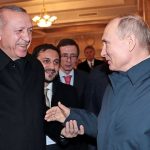While Donald Trump’s Jacksonian beliefs make him the current global disruptor-in-chief, in terms of America’s Middle East policy they paradoxically drag him back toward Washington’s traditional post-1979 stance in the region.
In complete contradiction to his nemesis Barack Obama, Trump’s White House has eschewed the former president’s revisionist strategy. Whereas Obama wanted to bring Iran in from the cold in order for the US to do less in the Middle East — the motivation for his highly contentious Iranian nuclear deal — to a man the Trump team has seen this shift as dangerous, allowing Tehran to be unfettered in its pursuit of greater regional power at the expense of the US and its allies.
Instead, Republicans of all hues have come to see the nuclear deal as strategic whistling past the graveyard of the worst sort, allowing an ostracized Iran back into the community of nations. It permitted Tehran to wait out the world, leading in the next generation to an economically far healthier Iran crossing the nuclear threshold, all without arousing international condemnation.
Trump’s more traditionalist policy has seen the majority of Middle Eastern powers revert to form: Saudi Arabia, Egypt and Israel remain close allies, even as Iran has reassumed its traditional role of enemy. But all is not as it was before Obama’s ill-fated foray into revisionism.
The fifth of the regional powers, pivotal Turkey, is no longer a US ally in the conventional sense of the term. Be it the issue of the S-400 controversy, the Syrian Kurds, drilling for natural gas off the coast of Cyprus, re-running municipal elections in Istanbul, or the Erdogan government’s increasingly anti-Western, neo-Ottoman foreign policy, the two former allies finds themselves increasingly at loggerheads.
As controversy has raged this past month over Ankara’s intended acquisition of the Russian-made S-400 missile defense system, this is merely the latest in a series of contentious issues over the past two years that makes it clear the US-Turkish relationship is not what it once was.
For Washington, Turkey has a binary choice: It can either have the S-400 or the F-35, but not both.
Dr. John C. Hulsman
The story of the S-400 anti-aircraft system is about far more than armaments; it amounts to a dramatic strategic schism between Washington and Ankara. For, in addition to the S-400 system designed by the Kremlin, the Erdogan government had already committed to buying 100 US-made F-35 fighter aircraft — what amounts to the Rolls-Royce of aviation. With the delivery of the F-35s pending, Ankara has gone ahead with the S-400 purchase, with the anti-aircraft system scheduled for delivery next month, with it becoming operational in September of this year.
It is not too much to say that these dual purchases have greatly alarmed the whole of the American defense establishment. First, the US worries that Russian S-400 maintenance technicians will, over time, have access to sensitive F-35 information.
Second, Turkish adoption of a Russian-made anti-aircraft missile defense system makes a key portion of Turkey’s defense not interoperable with its other NATO allies and their equipment, creating a real barrier to the joint NATO training exercises that amount to the lifeblood of the alliance.
Third, the S-400 is a learning system, meaning that its prolonged exposure to F-35 radar systems could give the Russians the necessary data to negate the F-35’s vital stealth properties, which make it such a formidable aircraft in the first place. For Washington, Turkey has a binary choice: It can either have the S-400 or the F-35, but not both.
Reacting to what amounts to an obvious breach in the strategic partnership between the two countries, America has pursued a carrot and stick policy of leveraging the obstinate Recep Tayyip Erdogan to change his mind. In terms of letting him down easy, Washington has offered its own Patriot missile defense system as an alternative to the S-400. Erdogan has repeatedly rejected this out of hand, spurning the deal as it fails to include provisions for technology transfers to Ankara.
In terms of sticks, in August 2018, the US Senate passed (and the president signed) two bills blocking delivery of the F-35 aircraft to Turkey until it is successfully certified that Ankara will not accept delivery of the S-400 system. The Turkish president, believing Trump to be more malleable over Turkish relations than his advisers clustered in the Pentagon, has called America’s bluff, moving ahead toward a major strategic rift by refusing to cancel the S-400 order, confident that the US president will blink. So Turkish-America relations will now be predicated on what amounts to a game of high-stakes poker.
Given the extremely fragile state of the Turkish economy, any American sanctions for following through with the S-400 order could have dire economic consequences for a country that could slide into recession.
But far greater damage lies beneath the waterline. Turkey’s very Western-leaning orientation, ingrained in the Turkish elite since the days of Kemal Ataturk, will have definitively come to an end. The S-400 controversy, if not adroitly managed, could well amount to the straw that breaks the camel’s back of the once-central US-Turkish alliance.
- By Dr. John C. Hulsman – is the president and managing partner of John C. Hulsman Enterprises, a prominent global political risk consulting firm. He is also senior columnist for City AM, the newspaper of the City of London. He can be contacted via chartwellspeakers.com.



